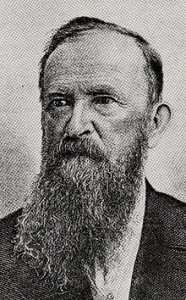Tennessee is home to many poor white Baptists, as Tennessee Baptist editor J. R. Graves is well aware. Acknowledging the circumstances of his readers, Graves often during the war years publishes, or re-publishes from other sources, advice on how to cope with hard times. U. S. blockades on southern trade routes portend a coming year of scarcity.
Today the editor offers several helpful suggestions that might be of benefit to readers of his paper:
“Coffee Making”
There is philosophy in making good coffee, which every house-keeper ought to know.
Parch slowly, stirring constantly, not less than two pounds of raw coffee at a time. Be careful not to let it get too hot, as a high degree of heat derives off the essential oil in which resides the aromatic and stimulating properties of the coffee which give it all its value. Keep your parched coffee in an air-tight and dark vessel. Grind only as it is needed for immediate use.
Put your ground coffee in a tin coffee-pot of the size your family need[s], so that it can be filled with cold water. Put it on or near the fire half an hour before it is to go to the table, but do not let it boil till just at the moment it is to be served. The boiling heat will drive off the aroma in a few minutes; but it should stand at a moderate heat some time before boiling to extract the delicacies of the berry. The hunter makes excellent coffee in his tin cup because he puts it in cold water, in his bright tin cup, and drinks it as soon as it boils.
The above recipe requires less coffee than any other.
———
“We Have Tried It”
We have been somewhat skeptical about the various substitutes that have been proposed for coffee.—We have doubted whether any thing would have the flavor of the genuine article. But, “the proof of the pudding is in the eating.” We have tried the okra coffee, and had we not known it to be okra, we should have supposed it the best of Laguyra or Java. It has all the rich spicy aroma of the genuine article, and we have no doubt, is equally nutricious [sic] and probably less injurious.
We would advise all our friends to reserve a large space in their gardens or farms, for planting okra. It will do, and no mistake, blockade or no blockade.
———-
“To Dye Wool Blue”
Take six pounds of wool, wash all the grease out, put it in a kettle, cover with water, add half a pound of alum dissolved in water, boil two hours, wring out and dry. Have another kettle, put in three bushels of parseline, (the common field pursley,) cover with water, cook until the stems are quite soft, strain through a basket, put the liquid back in the kettle, add one ounce of the extract of logwood and one ounce of sulphate capri (blue stone,) both previously dissolved, put the wool in, boil two hours, wring out and dry, and then wash the loose dye out. Spun wool can as easily be dyed in the hanks. If the dye does not stick after the first washing, too much logwood has been put in. For twenty years, Mrs. M. has used this dye, and finds it useful in servants clothing and mixed cloth and socks.
———
“For Rheumatics, Neuralgia, and Nervous Headache”
Mix one ounce oil rosemary; one ounce oil cloves; one ounce oil oreganum; one ounce spirits turpentine, one ounce spirits hartshorn; one ounce tincture cantharides; one ounce alcohol. Shake and pour a little in a saucer; set the saucer on embers, and rub in on the affected part with your hand. Warm your hand by a shovel of coals and hold it on the affected part to encourage absorption. The price of the compound should only be one dollar
Source: Tennessee Baptist, December 21, 1861 (link)



